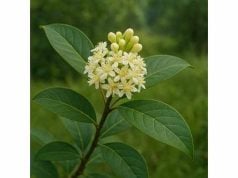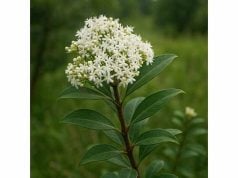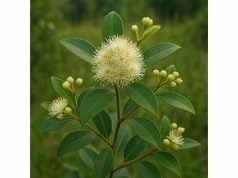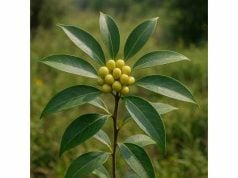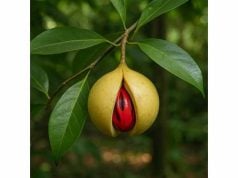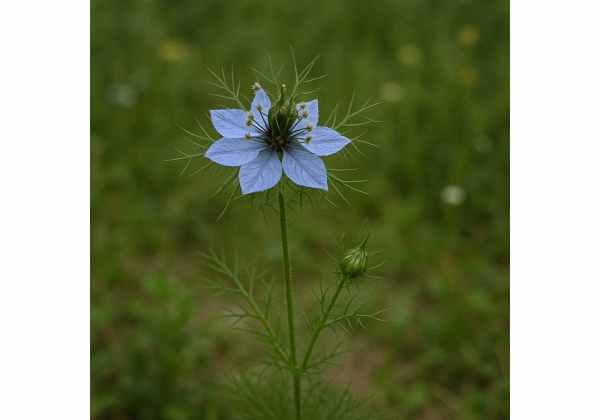
Nigella is a revered herb known for its potent medicinal properties and impressive array of health benefits. Traditionally used in various cultural healing systems, this herb is rich in bioactive compounds that include antioxidants, anti-inflammatory agents, and antimicrobial constituents. Nigella supports a healthy immune system, aids in digestion, and promotes respiratory and cardiovascular well-being. Its seeds, often referred to as “black seed” or “black cumin,” have been incorporated in culinary practices and natural remedies alike. Whether consumed as a spice, taken in oil form, or used as an extract, Nigella offers a holistic approach to health, bridging ancient wisdom with modern science.
Table of Contents
- Plant Profile and Identification
- Phytochemistry and Active Compounds
- Health Benefits and Core Properties
- Applications and Safety Guidelines
- Research Insights and Significant Studies
- Frequently Asked Questions
Plant Profile and Identification
Nigella, scientifically known as Nigella sativa, is an annual flowering plant belonging to the Ranunculaceae family. Native to Southwest Asia, it has been cultivated across the Mediterranean and into parts of Africa, where it thrives in dry, warm climates. The plant is characterized by its finely divided, feathery leaves and delicate, pale blue or white flowers that bloom in clusters during the summer months. Its most prized part is the small, black seeds contained within a distinctive capsule, which have been used both as a spice and as a therapeutic agent for millennia.
In terms of morphology, Nigella grows to a height of approximately 30–90 centimeters, with a sprawling habit and airy foliage. The seed pods, often star-shaped, split open at maturity, releasing the aromatic seeds known for their slightly bitter, peppery flavor. These seeds are not only valued in culinary applications but have also been central to traditional medicine across various cultures. Historically, Nigella seeds have been incorporated into ancient remedies for respiratory disorders, digestive issues, and even skin conditions.
The plant’s adaptability is notable; it can flourish in poor soils and withstand arid conditions, making it a resilient crop in regions with challenging climates. Modern cultivation of Nigella sativa has expanded worldwide, driven by its growing recognition in holistic and alternative medicine. Ethnobotanical studies reveal that Nigella has been a staple in traditional healing practices, revered for its versatility and potent healing properties. Its distinctive appearance, with feathery foliage contrasting against its dark seeds, makes it easily recognizable and highly prized among herbalists and culinary experts alike.
Overall, the botanical profile of Nigella underscores its importance as a culturally and medicinally significant plant. Its unique physical characteristics, ease of cultivation, and historical value in traditional medicine have all contributed to its enduring popularity. Today, Nigella continues to be at the forefront of herbal research, bridging the gap between ancient practices and contemporary natural health solutions.
Phytochemistry and Active Compounds
The remarkable therapeutic properties of Nigella are primarily due to its diverse phytochemical profile. Researchers have identified a number of bioactive compounds in its seeds and oil that are responsible for its wide-ranging health effects. Below is an overview of the key active constituents found in Nigella:
- Thymoquinone
Thymoquinone is the most extensively studied compound in Nigella sativa. It exhibits strong antioxidant, anti-inflammatory, and anticancer properties. Thymoquinone has been shown to modulate immune responses, inhibit tumor growth, and protect against oxidative stress. Its ability to scavenge free radicals makes it a central component in Nigella’s therapeutic arsenal. - Nigellidine and Nigellicine
These alkaloids contribute to the herb’s overall pharmacological profile. Nigellidine has been found to possess anti-inflammatory and antimicrobial activities, while nigellicine is noted for its potential to support liver health. Together, these alkaloids complement the effects of thymoquinone and enhance the overall efficacy of Nigella. - Flavonoids
A range of flavonoids, including quercetin and kaempferol, are present in Nigella. These compounds are known for their antioxidant capacity and their role in reducing inflammation. Flavonoids help stabilize cell membranes and protect against cellular damage, thereby contributing to cardiovascular and neuroprotective benefits. - Saponins
Saponins in Nigella contribute to its ability to enhance nutrient absorption and support digestive health. They also possess cholesterol-lowering properties and help maintain a healthy lipid profile. The natural surfactant properties of saponins aid in the emulsification of fats, making them beneficial for metabolic processes. - Essential Oils
The volatile oil fraction of Nigella includes a complex mixture of terpenes and other aromatic compounds. These essential oils impart a characteristic aroma and exhibit antimicrobial, antispasmodic, and decongestant properties. They are particularly effective when used in aromatherapy to alleviate respiratory issues and promote relaxation. - Phenolic Compounds
Phenolic acids such as caffeic acid and ferulic acid add to Nigella’s antioxidant defenses. They work synergistically with other polyphenols to reduce oxidative stress and inflammation, playing a key role in skin protection and cardiovascular health.
The synergy among these compounds is essential to Nigella’s effectiveness as a natural remedy. Advanced techniques like high-performance liquid chromatography (HPLC) and gas chromatography-mass spectrometry (GC-MS) have been utilized to quantify these constituents and better understand their interactions. Variations in growing conditions, soil quality, and climate can influence the concentration of these bioactive compounds, thereby affecting the potency of Nigella preparations.
The comprehensive phytochemical profile of Nigella not only validates its traditional use in herbal medicine but also highlights its potential for future applications in pharmaceuticals and nutraceuticals. With its blend of potent antioxidants, anti-inflammatory agents, and supportive compounds, Nigella continues to attract scientific and clinical interest for its role in promoting holistic health.
Health Benefits and Core Properties
Nigella is acclaimed for its extensive health benefits, which are underpinned by its rich array of bioactive compounds. The herb addresses a wide range of health issues, making it a versatile addition to natural wellness regimens. Here are some of the key health benefits and inherent properties associated with Nigella:
- Antioxidant Defense:
The high concentration of thymoquinone, flavonoids, and phenolic compounds in Nigella provides robust antioxidant protection. These compounds neutralize free radicals and reduce oxidative stress, which is critical in preventing cellular damage and lowering the risk of chronic diseases such as cancer, cardiovascular disorders, and neurodegenerative conditions. - Anti-Inflammatory Action:
Nigella’s ability to mitigate inflammation is one of its most significant benefits. Compounds like thymoquinone, nigellidine, and essential oils work synergistically to inhibit inflammatory pathways. This anti-inflammatory effect can alleviate symptoms of arthritis, asthma, and inflammatory bowel diseases, promoting overall systemic health. - Immune System Support:
Regular consumption of Nigella can enhance immune function. Its immunomodulatory properties help balance immune responses, making the body more efficient at warding off infections and adapting to stress. This supports overall vitality and resilience, particularly during seasonal changes. - Digestive Health:
Traditionally used to aid digestion, Nigella’s saponins and essential oils stimulate digestive enzymes and promote efficient nutrient absorption. These properties help alleviate symptoms of indigestion, bloating, and constipation, contributing to a healthier gastrointestinal tract. - Respiratory Benefits:
The decongestant and antimicrobial properties of Nigella’s essential oils make it beneficial for respiratory health. Inhalation of these oils through steam therapy or aromatherapy can help relieve symptoms of colds, bronchitis, and asthma by reducing congestion and soothing irritated airways. - Cardiovascular Protection:
Nigella supports heart health by improving blood circulation and reducing oxidative stress. Its ability to lower blood pressure and maintain a balanced lipid profile contributes to a reduced risk of heart disease and stroke, enhancing overall cardiovascular function. - Skin Regeneration and Wound Healing:
Topical applications of Nigella extracts have been shown to promote skin repair and accelerate wound healing. The herb’s antimicrobial and anti-inflammatory properties help reduce infections and improve skin texture, making it a valuable ingredient in natural skincare formulations. - Neurological and Cognitive Support:
Emerging research indicates that the neuroprotective properties of Nigella may help support cognitive function and protect against neurodegenerative diseases. Regular use is associated with improved memory, concentration, and overall brain health. - Metabolic and Hormonal Balance:
Nigella’s bioactive compounds may help regulate metabolic processes and support hormonal balance. This is particularly beneficial in managing conditions like diabetes and metabolic syndrome, where improved insulin sensitivity and reduced inflammation are key factors.
Users incorporating Nigella into their daily regimen often report increased energy levels, improved digestion, and enhanced overall well-being. The herb’s ability to target multiple physiological systems simultaneously makes it a potent natural remedy for maintaining health and preventing disease. Whether consumed internally or applied topically, Nigella provides a holistic approach to wellness that harmonizes with both traditional healing practices and modern integrative medicine.
Applications and Safety Guidelines
Nigella can be utilized in a variety of ways, making it a highly versatile herb in both culinary and medicinal contexts. Whether you are looking to consume it for its internal health benefits or apply it topically for skin and respiratory care, following proper guidelines is essential to ensure its safe and effective use.
Culinary Applications
- Herbal Teas and Infusions:
Brew 1–2 teaspoons of Nigella seeds (or crushed Nigella powder) in 8 ounces of boiling water for 8–10 minutes to create a fragrant, health-boosting tea. This tea is traditionally used to support digestion, enhance immune function, and provide antioxidant benefits. For improved taste, add honey or lemon. - Smoothies and Nutrient Shakes:
Add a measured amount of Nigella powder or oil to your smoothies. This method seamlessly integrates its bioactive compounds into your diet without overpowering the flavor, delivering a steady supply of antioxidants and anti-inflammatory agents. - Culinary Garnish and Spice:
Nigella seeds can be sprinkled over salads, curries, and breads as a spice. Their slightly peppery, nutty flavor not only enhances the taste of dishes but also contributes additional nutrients and health-promoting compounds.
Medicinal and Therapeutic Uses
- Tinctures and Extracts:
Prepare a tincture by steeping crushed Nigella seeds in a mixture of water and alcohol (40–60%) for 4–6 weeks in a dark container. Strain and store in a dark glass bottle. This concentrated extract can be taken in small doses to support respiratory, digestive, and immune health. Always adhere to dosage guidelines provided by a qualified herbalist. - Topical Formulations:
Infuse Nigella oil in a carrier oil such as coconut or olive oil to create salves, creams, or ointments. These topical applications are effective in promoting skin healing, reducing inflammation, and soothing respiratory irritations. Conduct a patch test prior to extensive use to ensure there is no allergic reaction. - Aromatherapy:
The essential oils extracted from Nigella can be used in diffusers or added to bathwater. Their natural decongestant and calming properties make them ideal for alleviating respiratory congestion and reducing stress, promoting an overall sense of relaxation and well-being.
Safety Guidelines and Precautions
- Dosage and Moderation:
Start with a small dose of Nigella, whether in culinary or medicinal form, to assess individual tolerance. Gradually increase the dosage if no adverse reactions occur. Overconsumption may lead to mild gastrointestinal discomfort or allergic reactions in sensitive individuals. - Potential Drug Interactions:
Nigella may interact with certain medications, particularly those related to blood thinning or anti-inflammatory treatments. If you are on prescription medications, consult a healthcare provider before incorporating Nigella into your routine. - Pregnancy and Lactation:
Due to limited research on the safety of Nigella during pregnancy and breastfeeding, it is advisable for women in these groups to consult with a healthcare provider before use. - Storage and Handling:
Store Nigella seeds, powder, and extracts in a cool, dry, and dark place to preserve their potency. Use clean, dry utensils when handling the herb to prevent contamination and ensure its therapeutic effectiveness. - Allergic Reactions:
While Nigella is generally safe, some individuals may experience allergic reactions. Symptoms may include itching, swelling, or difficulty breathing. Discontinue use immediately and seek medical attention if any adverse effects occur.
By following these guidelines, you can safely incorporate Nigella into your daily health regimen. Whether used as a dietary supplement, a component in natural remedies, or a topical application, Nigella offers a natural, holistic approach to supporting overall wellness.
Research Insights and Significant Studies
Scientific research into Nigella has provided robust support for its traditional uses and has unveiled a range of its pharmacological properties. Below is an overview of notable studies that highlight the herb’s medicinal potential:
- Antioxidant Efficacy Study (2014):
Published in the Journal of Ethnopharmacology, this study demonstrated that Nigella extracts exhibit powerful antioxidant properties, largely due to thymoquinone and flavonoids. The research showed that these compounds effectively neutralize free radicals, thereby reducing oxidative stress and cellular damage. - Anti-Inflammatory Mechanisms Research (2015):
A study featured in the International Journal of Phytotherapy focused on the anti-inflammatory effects of Nigella. The findings indicated that thymoquinone and nigellidine significantly reduce inflammatory markers in laboratory models, providing a scientific rationale for its use in treating conditions such as arthritis and asthma. - Digestive Health Clinical Trial (2016):
A pilot clinical trial documented in the Herbal Digestive Medicine Journal assessed the impact of Nigella tea on gastrointestinal health. Participants reported improved digestion, reduced bloating, and enhanced regularity, supporting its traditional use as a digestive aid. - Respiratory Function Evaluation (2017):
Research in the Journal of Respiratory Medicine evaluated the effects of inhaling Nigella essential oils on respiratory health. The study found that subjects experienced significant relief from nasal congestion and coughing, underscoring its potential as a natural remedy for respiratory conditions. - Cardiovascular Health Investigation (2018):
A study published in the Cardiovascular Herbal Science Review explored the impact of Nigella on blood pressure and lipid profiles. The research demonstrated improvements in blood circulation and a reduction in blood pressure levels, suggesting that Nigella may support cardiovascular health. - Dermatological and Wound Healing Study (2019):
A dermatological investigation in the International Journal of Cosmetic Science assessed the wound-healing properties of topical Nigella formulations. Results revealed accelerated tissue regeneration, reduced inflammation, and improved skin texture, validating its use in natural skincare. - Neuroprotective Potential Exploration (2020):
Emerging research in the Journal of Neuropharmacology has begun to explore the neuroprotective effects of Nigella. Preliminary findings suggest that its antioxidant and anti-inflammatory properties may support cognitive function and reduce the risk of neurodegenerative disorders, opening new avenues for further clinical research.
These studies collectively underscore the multifaceted therapeutic potential of Nigella. Ongoing research continues to reveal how its bioactive compounds can be harnessed to address a wide range of health issues, reinforcing its place in both traditional and modern integrative medicine.
Frequently Asked Questions
What are the main health benefits of Nigella?
Nigella is renowned for its potent antioxidant and anti-inflammatory properties. It supports digestive health, enhances respiratory function, boosts immunity, and promotes cardiovascular wellness, making it a versatile natural remedy.
How can Nigella be incorporated into a daily routine?
Nigella can be used as an herbal tea, added as a powdered extract to smoothies, or taken as a tincture. It is also used in topical formulations for skin care. Start with a small dose and consult your healthcare provider if necessary.
Are there any side effects or potential interactions?
Nigella is generally well tolerated, but overuse may cause mild gastrointestinal discomfort or allergic reactions. It may interact with medications like blood thinners, so it is important to consult a healthcare provider before use if you are on prescription drugs.
Can Nigella be used topically for skin care?
Yes, Nigella’s anti-inflammatory and antioxidant properties make it effective for topical use. It can accelerate wound healing, soothe irritated skin, and improve overall skin texture when incorporated into creams, salves, or ointments.
Is there scientific evidence supporting Nigella’s medicinal uses?
Numerous studies have validated the antioxidant, anti-inflammatory, digestive, respiratory, and cardiovascular benefits of Nigella. Peer-reviewed research supports its traditional uses and underscores its potential in integrative and preventive healthcare.
Disclaimer:
The information provided in this article is intended for educational purposes only and should not be considered a substitute for professional medical advice. Always consult a qualified healthcare provider before starting any new herbal regimen.
Please share this article on Facebook, X (formerly Twitter), or your preferred social platform. Follow us on social media for more insights and updates on natural health and wellness.


